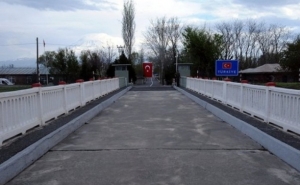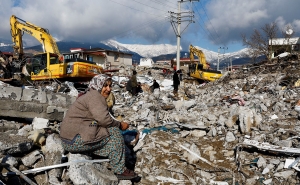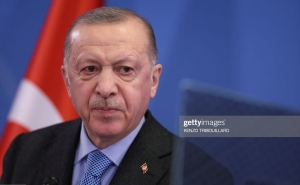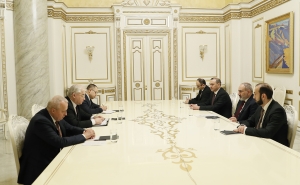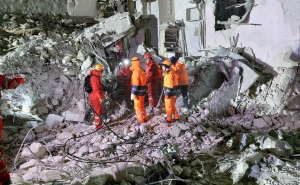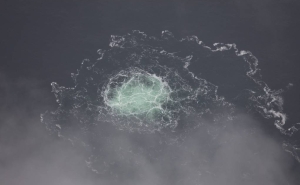 "Turkish Stream" Project: A Final Agreement between Russia and Turkey, or...?
"Turkish Stream" Project: A Final Agreement between Russia and Turkey, or...?

For the first time after the crisis between Moscow and Ankara, Russian President visited Istanbul to attend the 23rd World Energy Congress. After the closed meeting between the presidents Russia and Turkey signed the "Turkish Stream" gas pipeline intergovernmental agreement. The two countries had reached a consensus on another problematic issue: on discount in natural gas prices as part of the deal.
Russian Gazprom informed that the "Turkish Stream" gas pipeline would consist of two lines. The pipeline will carry Russian natural gas to Turkey and to Europe under the Black Sea. The Russian side plans to complete the construction of the first line by 2019. Its annual capacity is to be 15.75 billion cubic meters of gas (bcma). The second line will supply gas to European consumers.
The memorandum of understanding (MoU) for the construction of the Turkish Stream gas pipeline with a capacity of 63 billion cubic meters (bcm) of gas per year was signed between Russia’s Gazprom and Turkey’s BOTAŞ in 2014. At first they were going to complete the construction by December 2016. But the launch of the project was being postponed due to various reasons. As a result, in November 2015 the Russian side said the "Turkish Stream" gas pipeline project would be changed, its annual capacity will be reduced by about two times and the launch of the project would be postponed until the end of 2017.
Then amid the tensions between the countries after the downing of the Russian Su-24 bomber by Turkish forces over the Syrian border in November 2015, the project was postponed. In September 2016 Gazprom said it received through diplomatic channels first permits from the authorities of Turkey for the implementation of the "Turkish Stream".
At this stage when Moscow and Ankara announce about overcoming the crisis between the two countries the launch of the project through the signing of the intergovernmental agreement is a serious impulse that should be considered both at bilateral and global levels.
At first, the "cold atmosphere" between the countries since November 2015 was hard to describe as a crisis as despite the aggressive rhetoric, military, political and economic cooperation between Ankara and Moscow continued. Almost the same way the process of Turkish-Israeli crisis and then the reconciliation took place. If we follow this logic Moscow and Ankara now try to demonstrate the process of reconciliation. And from this point of view the signing of the intergovernmental agreement on such a problematic issue like the "Turkish Stream" may serve this purpose. It means the signing of the intergovernmental agreement cannot still guarantee the implementation of the project. It may be signed for propaganda purposes.
The intergovernmental agreement between the two states is noteworthy also due to their strained relations with the West. It is obvious that one of the main aims of the agreement is to give the appropriate impulse to the West. The joint statement of Erdogan and Putin on the common vision in Syria pursues the same goal.
At the same time realizing the need of weakening the resistance of the EU for the implementation of the project Turkey and Russia try to involve European countries and obtain their consent. Particularly, Turkish Prime Minister said the construction of the pipeline "would strengthen Europe's energy security and they have no reason to worry". In his turn during his speech in Istanbul Putin said "Russian energy exports were a guarantee for the successful functioning of many countries’ economies". "I will only mention that our oil and gas account for more than a quarter of the European Union’s energy consumption," he said, Kremlin press service informs. At the same time Russia holds intensive talks with European countries, particularly Greece, to come to an agreement on rapid implementation of the project. Earlier such negotiations were being held with Hungary, Macedonia and Serbia.
From this point of view "the political landscape" can also be beneficial for the implementation of the project. For example, the Iranian side welcomed the signing of the agreement and said the Iranian government may come to an agreement with Turkey and use the "Turkish stream" pipeline to supply the Iranian gas to Turkey and then to Europe, adding that it depends on "the political landscape". Iranian involvement in the project may increase the effectiveness of the project. And if we accomplish the above mentioned, the fact that Russian Gazprom wants to cut gas supplies to Europe through Ukraine then the implementation of the "Turkish stream" pipeline project becomes more realistic.
In case of successful implementation of the project Turkey’s energy role in the region will greatly increase. But one should take note that there are lots of difficulties that need to overcome. It will not be easy to come to an agreement with Brussels on gas consumption through this pipeline and perhaps this is the reason why Russia saves time and at the first stage being satisfied with the construction of the first line that is designed only for Turkish consumers in order to get the "general political landscape". Perhaps this is why Russia reduced the annual capacity of the pipeline by about two times. It is not excluded that Russian may have designed another way to supply its gas to Europe through another way, for the example, thought the agreement with Iran.
If we add to this the adventurous stance of Turkey that may refuse the project at any time it becomes clear that it is too early to talk about the successful implementation of the "Turkish stream" pipeline project.
Other materials on this subject
- Putin, Erdogan to meet in Astana While Türkiye and Russia's steps will disturb certain circles, they will make less developed countries happy," Erdoğan said, referring to a deal he helped broker paving the way for Ukrainian grain deliveries...
- Putin and Erdogan to Discuss Expanding Trade and Economic Ties The two leaders will hold an in-depth discussion on the multifaceted Russian-Turkish cooperation, including plans to expand trade and economic ties and the implementation of joint strategic energy projects....
- Erdogan Says US Delays Deliveries of F-16 Fighter Jets To Turkish Air Force This issue is still on the table, Erdogan explained at a press conference before leaving for the NATO summit in Madrid.
- Erdogan Hopes To Hold Talks With Putin Our desire is to bring together Presidents of Russia and Ukraine in Istanbul or Ankara.
- S-400 System May be Delivered to Turkey on Tuesday, Newspaper Says The S-400 system was loaded onto two cargo planes on Monday night. The planes are expected to depart for Turkey from an airbase near the Russian city of Tver on Tuesday, Haberturk added.
-
 17:08
17:08The regular session of the Anti-corruption Policy Council takes place in Jermuk
-
 15:05
15:05The Prime Minister sends congratulatory messages to the supreme leader of Iran and the President of Iran
-
 11:11
11:11Armenia sends earthquake aid to Turkey
-
 10:43
10:43Commemoration of the Pontiff St. Sahak Partev
-
 09:16
09:16Some roads are closed and difficult to pass in Armenia
-
 19:55
19:55Phone conversation of the Foreign Minister of Armenia with the U.S. Assistant Secretary of State for European and Eurasian Affairs
-
 18:30
18:30Prime Minister Pashinyan and President Khachaturyan meet
-
 18:20
18:20Ararat Mirzoyan with Co-Chairman of the OSCE Minsk Group of France Brice Roquefeuil
-
 17:01
17:01Humans could land on Mars within 10 years, Musk predicts
-
 16:45
16:45France, US urge 'immediate' end to Nagorno Karabakh blockade
-
 16:01
16:01Blockaded Nagorno Karabakh launches fundraiser to support quake-hit Syria
-
 15:59
15:59Earthquake death toll in Turkey rises to 18,342
-
 15:43
15:43Ararat Mirzoyan Held a Telephone Conversation with Sergey Lavrov
-
 15:06
15:06French president rules out fighter jet supplies to Ukraine in near future
-
 14:47
14:475 Day Weather Forecast in Armenia
-
 14:44
14:44President Vahagn Khachaturyan wrote a note in the book of condolences opened in the Embassy of Syria in Armenia
-
 14:20
14:20Azerbaijan’s provocations impede establishment of peace and stability – Armenian FM tells Russian Co-Chair of OSCE MG
-
 12:57
12:57France representation to OSCE: Paris calls on Azerbaijan to restore freedom of movement through Lachin corridor
-
 11:40
11:40Command of Kosovo forces highly appreciated preparation of Armenian peacekeepers
-
 10:16
10:16The United States withdrew from sanctions against Syria for six months the provision of assistance after the earthquake
day
week
month
Humidity: %
Wind: km/h


